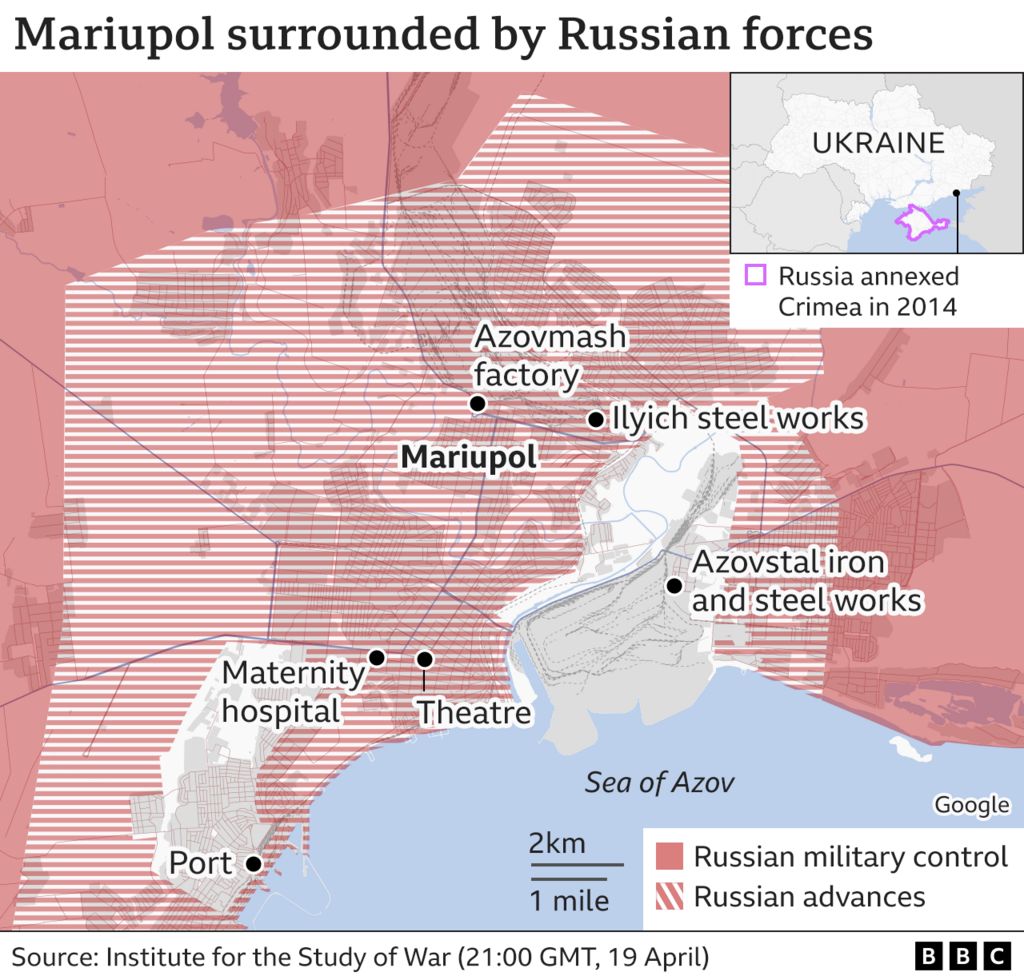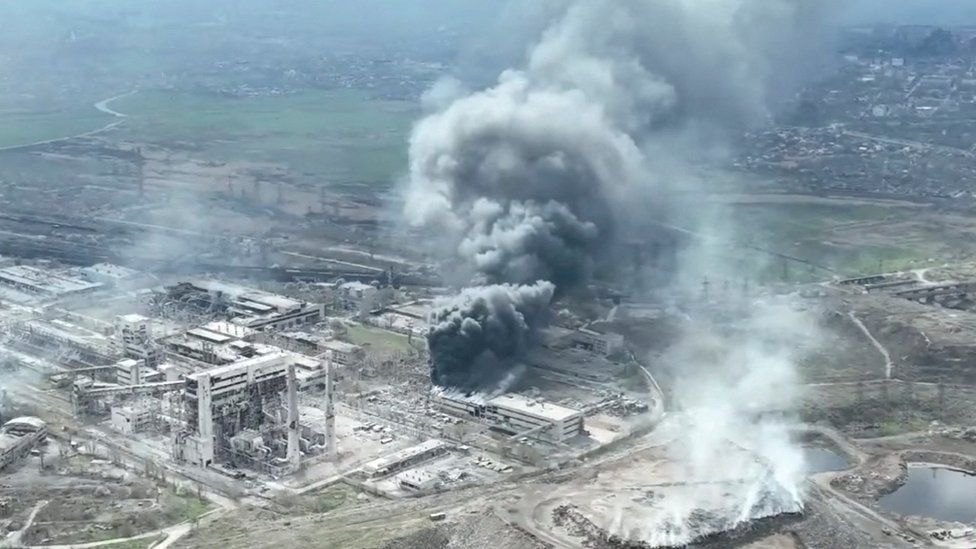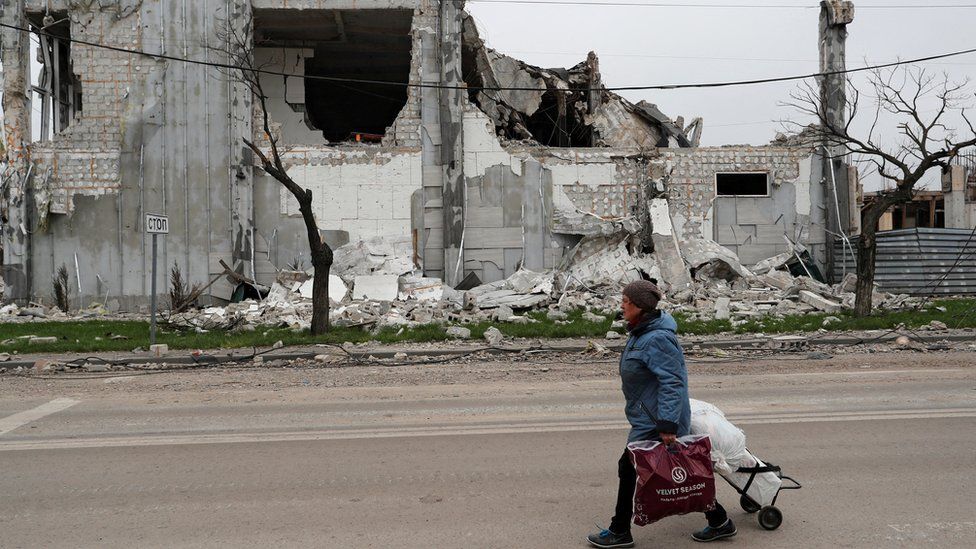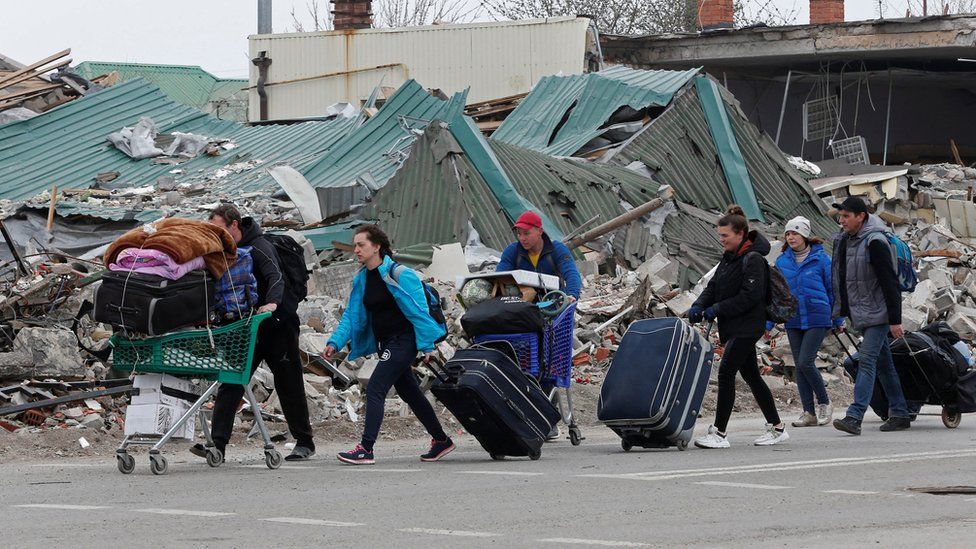The deadline of a Russian ultimatum demanding the surrender of Ukrainian forces in Mariupol has passed with no sign that the troops have complied.
The final Ukrainian holdouts, reportedly accompanied by 1,000 civilians, have taken shelter in the city’s massive Azovstal steel plant.
Moscow’s ultimatum comes as the local Ukrainian commander warned his troops can hold out for just “days or hours”.
But Kyiv says there is a tentative deal to rescue some civilians from the city.
Ukraine’s Deputy Prime Minister, Iryna Vereshchuk, wrote on Facebook that women, children and the elderly would be allowed to leave Mariupol under the deal.
The city’s mayor, Vadym Boichenko, told national TV that Ukraine hopes to send 90 buses to evacuate about 6,000 people on Wednesday. He said around 100,000 people remain trapped in Mariupol.
Remaining civilians wishing to leave were instructed to gather at 14:00 local time (11:00 GMT), when it was hoped a convoy of buses would take them towards western Ukraine.
But it is not clear whether the evacuation has yet taken place.
“It’s too early to tell what will happen,” Mariupol Deputy Mayor Serhiy Orlov told the BBC.
He added that city officials still hadn’t received confirmation from Russian forces that the residents would be allowed out.
The Azovstal Iron and Steel Works – a massive, four sq-mile (10 sq km) plant in the south-east of the city – has become the last centre of the Ukrainian resistance in Mariupol.

As Russian forces advanced slowly into the heart of Mariupol, the sprawling complex became a home to thousands of Ukrainian soldiers, including fighters from the Azov battalion – a controversial national guard unit with links to the far-right.
The site is a mass of tunnels and workshops, and provides a natural advantage to defenders.
Yan Gagin, an official with the separatist Donetsk People’s Republic, told Russian state news network RIA Novosti over the weekend that there is “basically another city” beneath the plant.
Russia has been bombarding the factory with artillery and air raids, and Moscow has issued two demands for the troops to surrender. An advisor to President Volodymyr Zelensky said Russia is targeting the defenders with bunker busters – colossal bombs designed to penetrate thick armour and kill targets underground.
 IMAGE SOURCE,REUTERS
IMAGE SOURCE,REUTERSThis is the second ultimatum Ukrainian troops at the plant have faced this week. Despite this, and the vicious nature of the Russian siege, Ukraine’s defence ministry said not a single soldier surrendered when a similar ultimatum lapsed on Monday.

Are you in Mariupol – or do you have relatives or friends who remain in the city? If it’s safe:
- Email: haveyoursay@bbc.co.uk
- WhatsApp: +44 7756 165803
- Tweet: @BBC_HaveYourSay
- Please read our terms & conditions and privacy policy

It is unclear how many Ukrainian troops remain in the city, but in a video message sent to the BBC, the local marine commander Major Serhiy Volyna, said around 500 injured troops were being cared for at the steel plant.
Maj Volyna, who leads the 36th marine battalion, said his troops were running low on supplies and that the video marked “our last address to the world. It may be our last one ever”.
He said that Russian forces outnumbered his own by “dozens of times,” and that while Ukrainian morale remains high, Moscow’s forces “prevail in the air, in artillery, in ground troops, and in machines and tanks”.
Meanwhile, Deputy Mayor Orlov warned that basic supplies at the plant have almost run out.
“They have an absolute lack of everything. A lack of water, food, medicines, help, and Russia totally blocks everything, any humanitarian help or evacuation,” he told the BBC’s Newshour programme.
Olena Nikulina’s cousin is fighting with Ukrainian forces in Mariupol. She said her last contact with him had been on 8 March when he told her his unit had “very little food and medical supplies – and it’s harder and harder to treat wounded soldiers”.
Civilian corridors
 IMAGE SOURCE,REUTERS
IMAGE SOURCE,REUTERSUkrainian officials say around 100,000 civilians remain in the city, which has been almost totally levelled by the Russian bombardment.
While several previous attempts to organise humanitarian corridors from the city have failed, with both Russia and Ukraine accusing each other of bad faith in negotiations and refusals to guarantee compliance with ceasefires. But Ms Vereshchuk said Moscow has agreed to allow 6,000 people to evacuate the city on Wednesday.
Ukraine has previously alleged that Russia has been forcibly evacuating thousands of Ukrainian civilians from the city into Russia.
Why has Russia concentrated on Mariupol?
US defence officials said on Tuesday that around 76 battalion tactical groups – combined Russian armour, infantry and air defence units – are operating inside Ukraine, with around 12 of these focused on the assault in Mariupol.
If the city were to fall it would free up around 10,000 troops to take part in the refocused Russian assault on the Donbas region, and allow Moscow to link up its forces on the annexed Crimean Peninsula with separatist forces in the east.
If Mariupol was seized, Russia would also end up with full control of the Sea of Azov, cutting-off its maritime trade and further isolating it from the world.
The fall of Mariupol would also offer President Vladimir Putin a major propaganda opportunity.
His forces have only captured one major Ukrainian city – Kherson – and seizing Mariupol would enable the Kremlin to show its population that Russia was achieving its aims and making progress.
Capturing the Azov battalion would also allow Mr Putin to play into his baseless narrative that the Ukrainian government has been overrun by “Nazis”.
Source: BBC News


